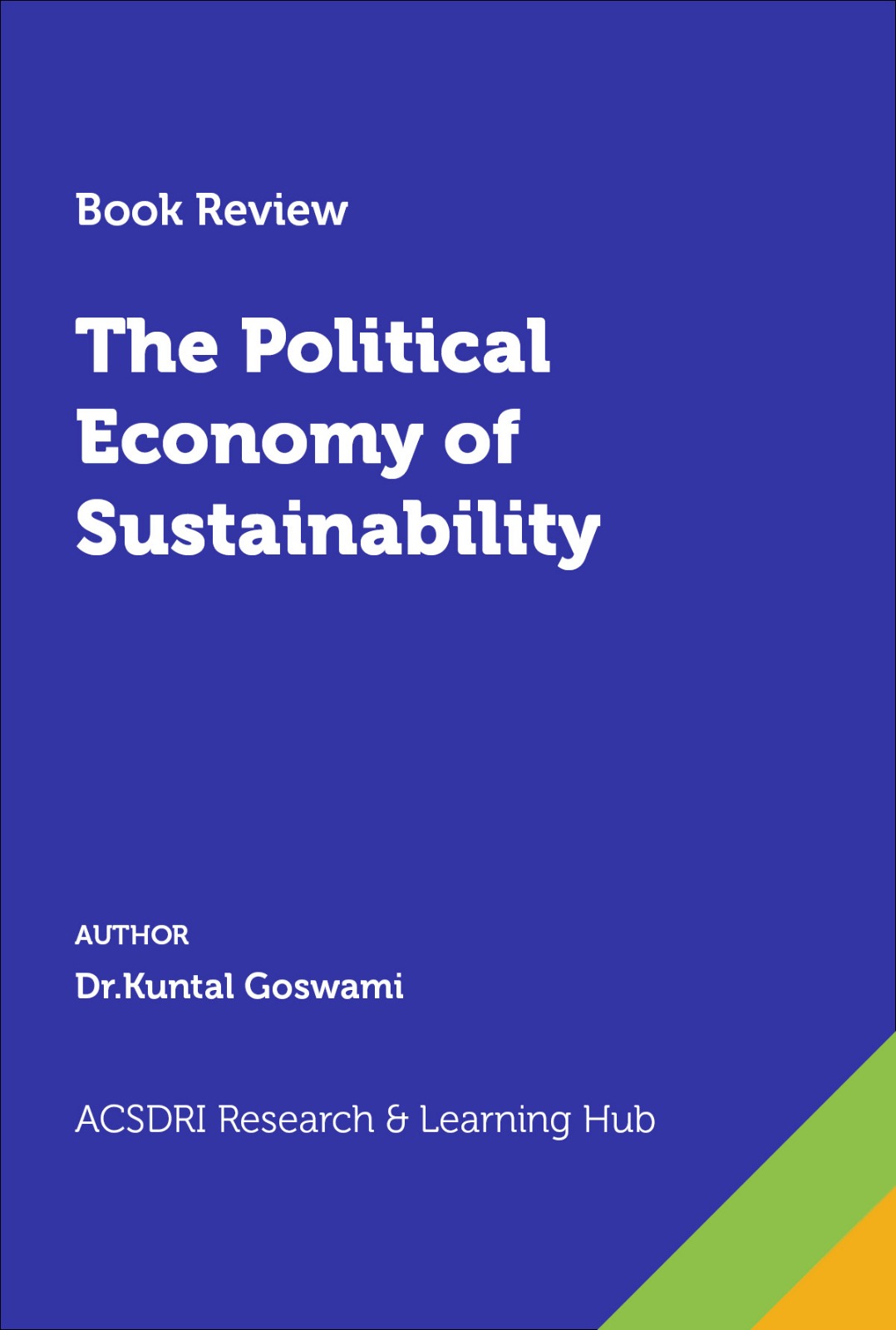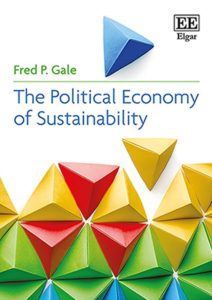Book Review
Book Review: The Political Economy of Sustainability

Book Review on The Political Economy of Sustainability
Key Words: Political Economy, Sustainability, Sustainable Development, Political-economy of Sustainability
Citation: Goswami, K (2019), ‘The Political Economy of Sustainability, Cheltenham, and Northampton, MA, Edward Elgar Publishing’ Book Review in Journal of Development Policy and Practice, Vol. 4. No.1, pp 1-3. https://doi.org/10.1177/2455133318811729
This book is an intellectually stimulating academic work on the political economics of sustainability. It covers many topics, making it a valuable academic resource for a university’s master’s level course and any academic research work. Although Professor Gale took an academic approach, the book is also meant for a quick pickup at any airport bookshop. It will be a great treasure for someone’s library and a must-read for policymakers.
The title will attract a reader’s attention as it conveys a message. The book critically answers the ‘why’ question. It explains why the sustainability agenda has not been able to spread out its wings fully, even though it has noble intentions and is embedded in good values and principles. The author succinctly describes the standpoint of the ‘political economy of sustainability.’
Fred P. Gale, in his book, mentioned that:
- [W]ithin political economy, the usefulness of things is only considered from an anthropocentric perspective. Things are useful to individuals and groups, never to the natural systems of which they are inherent and perform a vital function. In short, no resources within the political economy account for a thing’s nonhuman usefulness. From the standpoint of a political economy of sustainability, it recognizes that a thing can be helpful beyond its usefulness to humans.
The book explains the political–economic dimension of sustainability; in addition, the book provides a sound conceptual clarity to the concept of ‘economic nationalism,’ ‘communitarianism,’ ‘development,’ ‘economic liberalism,’ ‘economic value,’ and ‘economic socialism.’
The book analyses arguments of neoclassical economics, Keynesianism, Marxism, and the thoughts of David Ricardo and Adam Smith. After providing conceptual clarity, the book educates the reader on the evolutionary synthesis of environmental thought and analyses the corresponding arguments of each school of environmental thought.
The author also discusses key intellectual arguments of some classical books such as An Essay on the Principle of Population, Wealth of Nations, A Thousand Mile Walk to the Gulf, The Fight for Conservation, Silent Spring, Population Bomb, The Closing Circle, The Entropy Law and the Economic Process, The Limits to Growth and the Steady State Economics.
In the following chapters, the book provides a comprehensive chronology of the sustainable development movement. It evaluates the practical usefulness of various sustainability measurement tools such as Genuine Progress Indicator (GPI), Adjusted Net Savings (ANS), Living Planet Index (LPI), Ecological Footprint (EF), Human Development Index (HDI), Environmental Performance Index (EPI), Better Life Index (BLI), Green Growth Indicators (GGIs), Sustainable Development Goals (SDGs) and the World Happiness Report (WHR). In the subsequent chapters, Professor Gale appraises the concept of ‘value of wealth’ in the corporate sector and analyses the degree of stakeholder participation in the corporate sector and the quality of corporate governance in the corporate sector. He further illustrates the way sustainability values are shaped by the B-Corps movement.
The book reaches its climax in Chapter 7 as it critically analyses the interplay of sustainability values, economy, and politics in the Western political and international institutional domain. The author has provided empirical evidence of the ‘value hierarchies in the British political system under different party leaders.’
In this context, the author mentions that.
- …political parties are not incredibly well adapted to deliver sustainability value… They either emerged as ideological parties with pre-established value hierarchies prioritizing exchange value, national use value, or function value as mass parties prioritizing labor value (socialist) or national use value (fascist), or as populist parties of the left or right targeting elites as the problem…all political parties were identified as the most promising of the different party types. However, their pragmatic approach to winning elections also militates them against delivering balanced economic value outcomes as they seek to appeal to the median voter without alienating their partisan base.
Other key highlights of this chapter are an analytical discussion on ‘Free Trade versus Protectionism’ and interest mediation at the World Trade Organization and the International Labour Organization.
Chapter 8 insightfully analyses the sustainability agenda from the behavioral economics perspective and discusses the concepts of homo-cognitive preference, homo-biologics preference, homo-sociological preference, homo-cultural preference, and how individual and group preference determine the distribution of goods and services. The key highlight of this chapter is probably best described in the author’s own words.
- [T]he complex interaction of biology, sociology, cognition, and culture …factors shape an individual’s choice of goods in the marketplace or vote in an election…deficiencies in human values, beliefs, and preferences create opportunities for the unscrupulous to exploit them, suggesting the need for far more attention to be paid to how social, cultural and cognitive institutions are and should be governed. The example of higher education illustrated how imperfect mind-ware in the form of neoclassical economics was installed in several generations of academics and students, steering them toward the belief that economic value starts and ends with exchange value.
Hence, The Political Economy of Sustainability by Associate Professor Fred P. Gale is a one-stop knowledge source and provides a comprehensive understanding of the different dynamics of the complex sustainability agenda.
 BUY from Amazon
BUY from Amazon
https://www.amazon.com.au/The-Political-Economy-of-Sustainability/dp/1785368001


